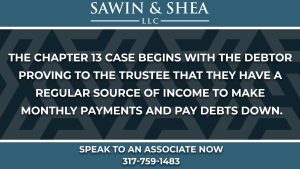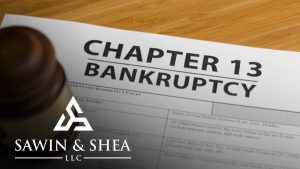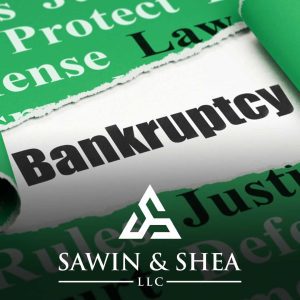Chapter 13 Bankruptcy Lawyers Serving Indianapolis and Central Indiana
What is Chapter 13 Bankruptcy?
Chapter 13 bankruptcy in Indiana, is a legal process that allows individuals to reorganize their debt under the protection of the federal bankruptcy court. It provides bankruptcy protection from creditors who are moving to foreclose on homes or repossess cars.

Chapter 13 is used to help Indiana residents with the following purposes:
- Stop foreclosure and save your home.
- Protect your car from repossession.
- In some cases eliminate your 2nd mortgage.
- Debtors can often lower car loan interest rates.
- Pay back certain debts that are not dischargeable in Chapter 7.
Unlike liquidating assets through Chapter 7 bankruptcy, Chapter 13 focuses on debt repayment based on the debtor’s income and assets. This plan typically covers secured debts like mortgage payments and car loans and a portion of unsecured debts like credit card bills. This process allows a trustee to distribute your funds and pay down back debts without losing your house or car.
Eligibility Requirements for Chapter 13 Bankruptcy

To qualify for Chapter 13 bankruptcy, individuals must meet specific eligibility criteria.
The Chapter 13 case begins with the debtor proving to the trustee that they have a regular source of income to make monthly payments and pay debts down. This income can come from various sources, including wages, business profits (if you’re self-employed), social security, or rental income.
Second, the debtor’s unsecured debt must not exceed $465,275, and secured debts must not exceed $1,395,875. These limits, which are subject to periodic adjustment, help ensure that Chapter 13 is appropriate for individuals with manageable credit card debt levels. High income earners have more room to make payments, but creditors want to make sure balances can reasonably be repaid within the plan’s timeframe.
Additionally, the Chapter 13 debtor must have filed all required tax returns for the previous four years. This ensures the debtor can feasibly follow a repayment plan and benefit from the protections of Chapter 13.
If you’re unsure whether you qualify for relief from creditors, call us at 317-759-1483 for a free consultation and personalized eligibility assessment.
Advantages of Filing Chapter 13 Bankruptcy

Chapter 13 bankruptcy helps you get out from under debts incurred prior to filing. The automatic stay immediately stops all collection actions, including harassing calls, lawsuits, and wage garnishments.
This legal protection can stop foreclosure and allow creditors to catch up on missed mortgage payments or car payments. The structured repayment consolidates debt into one monthly payment. Chapter 13 makes it easier to budget and plan for the future.
How Much Does it Cost To File Chapter 13?
The filing fee for a Chapter 13 bankruptcy case is around $313. There also may be additional costs associated with credit counseling, debtor education courses, and attorney fees. Attorney fees paid to file will vary based on the complexity of your particular case. Most Chapter 13 fees are made part of the monthly payment plan you make to the Chapter 13 Trustee.
Impact of Chapter 13 Bankruptcy on Your Credit Score

Filing for Chapter 13 bankruptcy will significantly impact your credit score. Initially, it can cause a substantial drop, as the Chapter 13 bankruptcy filing indicates financial distress. In situations where your credit has already been affected by debt, a Chapter 13 can give you a platform to start making your credit better.
Chapter 13 bankruptcy will stay on your credit report for up to seven years from the filing date. This can affect your ability to obtain new credit, secure loans, or even rent an apartment, as potential lenders and landlords often view Chapter 13 bankruptcy negatively.
Co-signers on your debts can also be negatively impacted by bankruptcy proceedings. However, the impact is not permanent, and there are steps you can take to improve your credit score during and after the repayment.
One of the most essential actions is to consistently make on-time payments as outlined in your Chapter 13 plan. This demonstrates financial responsibility and can gradually rebuild your creditworthiness. Additionally, you can start rebuilding your credit using a secured credit card, which requires a deposit that acts as your credit limit. Responsible use of this credit card debt, including paying off the balance in full each month, can help improve your credit score over time.
Steps To File Chapter 13 Bankruptcy in Indianapolis
Filing for Chapter 13 bankruptcy in Indianapolis involves several steps including at least one hearing, ( a hearing called a meeting of creditors), and evaluating any prior case of bankruptcy you may have been part of.
First, you must complete a mandatory credit counseling session with an approved agency. This will include making a list of debts, income, and a brief description of each of your assets.
Next, you’ll need to gather and submit all necessary financial documents, including income statements, tax returns, and bank statements. The debtor proposes a plan to repay each creditor within your budget.
You then file a Chapter 13 bankruptcy petition with the Bankruptcy Court and a proposed repayment plan.
This plan outlines how you (via the trustee) will pay your debts over the designated period. After filing, you’ll attend a meeting of secured and unsecured creditors, where the bankruptcy trustee and creditors can ask questions about your financial situation and plan. Creditors very rarely show up to this hearing.
Sometimes, at the first meeting of creditors, a creditor doesn’t agree to your proposed plan and can object to the approval of the plan. Ultimately a bankruptcy judge decides whether your plan meets the requirements of Chapter 13 bankruptcy law. Once the court approves your plan, debtors begin paying the trustee, who distributes the funds to your creditors. Bankruptcy protection begins as soon as the court approves your plan payments.
Have a home? Protect it with a Chapter 13 filing. Contact us at 317-759-1483 for a free consultation, available 24/7, to get started.
How the Chapter 13 Repayment Plan Works

The Chapter 13 repayment strategy is central to the bankruptcy process. It determines how the debtor will repay debts over three to five years. Payments are calculated based on the debtor’s disposable income, which is the income left after essential household expenses like food, housing, and transportation.
The Chapter 13 bankruptcy trustee, a court-appointed official, oversees the payment plan and ensures payments are distributed correctly to creditors. Secured debts, such as mortgages and car loans, are prioritized, followed by priority debts like taxes and child support.
Unsecured debts, such as credit card balances, are often paid pennies on the dollar, with any remaining balance discharged at the end of the full payment plan. Unsecured creditors receive a smaller person of the balance, but do not have to work hard to collect the balance and interest owed.
This structured approach allows debtors to work with the trustee to make regular payments.
Secured Debts in Chapter 13 Bankruptcy
In Chapter 13 bankruptcy, Indiana debts are those backed by collateral, such as a house or car. Your plan to repay your creditors will prioritize these debts, ensuring you can catch up on missed payments and retain your property. For payments to the mortgage company, Chapter 13 allows debtors to stop foreclosure by including overdue payments in your plan. It may come with a reduction in interest.
For a car loan, it can stop repossession and may even reduce the car loan’s interest rate or principal balance, depending on the financial circumstances of the debtor. The critical advantage is retaining essential property by avoiding foreclosure and repossession while reorganizing and managing your debts. An automatic stay of repossession is issued during court proceedings.
Unsecured Debt in Chapter 13 Bankruptcy Case
Unsecured debt is not backed by collateral and includes credit card balances, medical bills, and personal loans. In Chapter 13, these are paid according to your disposable income and the repayment terms.
While the debtor may not be required to pay these balances in full, the plan payments may result in partial repayment, with the remaining balance discharged at the end of the plan period. This means that, depending on your financial situation, you may only pay a fraction of what you owe on unsecured debts in one monthly payment. This restructuring of balances owed to creditors can bring significant relief and a fresh financial start.
Ready to reduce your unsecured debts? Call us at 317-759-1483 for a free 24/7 consultation and learn how Chapter 13 can help you manage your finances.
Tax Debt in Indiana Chapter 13 Bankruptcy

In Indiana Chapter 13, tax debt additionally is labeled priority or non-priority, and this classification ensures it’s properly treated within the repayment strategy.
Priority tax debt, which include most federal, state, and local tax return balances, must be paid in full through the Chapter 13 plan. These are typically recent balances that cannot be discharged and are given priority over other unsecured debts. The proposed payment plan will allocate funds to pay these off over a three—to five-year period, ensuring that the debtor fulfills their tax obligations.
Non-priority tax debt, on the other hand, may include older tax liabilities or certain penalties. These balances are treated similarly to unsecured debts, meaning they might not have to be paid in full. Depending on the debtor’s disposable income and the amount of the debt, a portion of these non-priority balances can be discharged at the end of the Chapter 13 plan, provided the debtor has complied with all plan requirements.
It’s also important to note that during the Chapter 13 repayment period, the debtor must continue to file their returns and stay current with any new tax obligations. Failing to do so can jeopardize the bankruptcy case and the discharge of remaining balances.
Modifying a Chapter 13 Plan
Life can be unpredictable, and sometimes, changes in circumstances require adjustments to a Chapter 13 plan. If the debtor experiences a significant change in income, they may petition the court to modify their plan.
To request a modification, the debtor must provide evidence of the change in circumstances and demonstrate why the modification is necessary.
Contact Sawin & Shea Chapter 13 Bankruptcy Indiana Attorneys
Navigating the complexities of Chapter 13 can be challenging, but each experienced bankruptcy attorney at Sawin & Shea is here to help.
We understand the importance of protecting your assets and resolving your debt issues. Our team will guide you through each process step, from filing the petition to developing a repayment strategy tailored to your needs. Contact Sawin & Shea today at 317-759-1483 for a free Chapter 13 consultation and take the first step toward financial stability.


